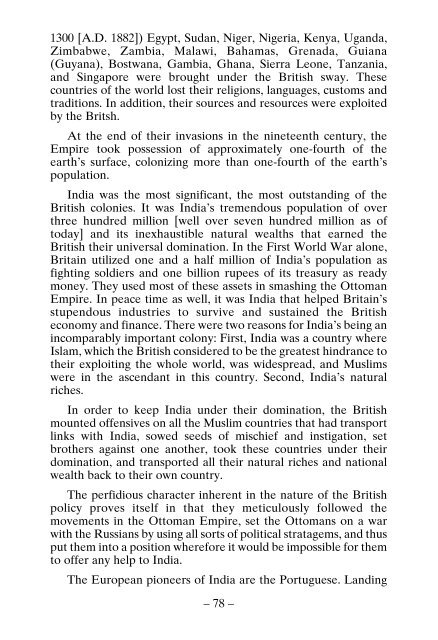Confessions Of A British Spy
Muhammad of Najd was the sort I had been looking for. For his scorn for the time’s scholars, his slighting even the (earliest) four Khalîfas, his having an independent view in understanding the Qur’ân and the Sunna were his most vulnerable points to hunt and obtain him. So different this conceited youngster was from that Ahmed Efendi who had taught me in Istanbul! That scholar, like his predecessors, was reminiscent of a mountain. No power would be able to move him. Whenever he mentioned the name of Abû Hanîfa, he would stand up, go and make an ablution. Whenever he meant to hold the book of Hadîth named he would, again, make an ablution. The Sunnîs trust this book very much. Muhammed of Najd, on the other hand, disdained Abû Hanîfa very much. He would say, “I know better than Abû Hanîfa did. In addition, according to him, half of the book of wrong.
Muhammad of Najd was the sort I had been looking for. For
his scorn for the time’s scholars, his slighting even the (earliest)
four Khalîfas, his having an independent view in understanding
the Qur’ân and the Sunna were his most vulnerable points to hunt
and obtain him. So different this conceited youngster was from
that Ahmed Efendi who had taught me in Istanbul! That scholar,
like his predecessors, was reminiscent of a mountain. No power
would be able to move him. Whenever he mentioned the name of
Abû Hanîfa, he would stand up, go and make an ablution.
Whenever he meant to hold the book of Hadîth named he would, again, make an ablution. The Sunnîs trust this book
very much.
Muhammed of Najd, on the other hand, disdained Abû Hanîfa
very much. He would say, “I know better than Abû Hanîfa did.
In addition, according to him, half of the book of wrong.
Create successful ePaper yourself
Turn your PDF publications into a flip-book with our unique Google optimized e-Paper software.
1300 [A.D. 1882]) Egypt, Sudan, Niger, Nigeria, Kenya, Uganda,<br />
Zimbabwe, Zambia, Malawi, Bahamas, Grenada, Guiana<br />
(Guyana), Bostwana, Gambia, Ghana, Sierra Leone, Tanzania,<br />
and Singapore were brought under the <strong>British</strong> sway. These<br />
countries of the world lost their religions, languages, customs and<br />
traditions. In addition, their sources and resources were exploited<br />
by the Britsh.<br />
At the end of their invasions in the nineteenth century, the<br />
Empire took possession of approximately one-fourth of the<br />
earth’s surface, colonizing more than one-fourth of the earth’s<br />
population.<br />
India was the most significant, the most outstanding of the<br />
<strong>British</strong> colonies. It was India’s tremendous population of over<br />
three hundred million [well over seven hundred million as of<br />
today] and its inexhaustible natural wealths that earned the<br />
<strong>British</strong> their universal domination. In the First World War alone,<br />
Britain utilized one and a half million of India’s population as<br />
fighting soldiers and one billion rupees of its treasury as ready<br />
money. They used most of these assets in smashing the Ottoman<br />
Empire. In peace time as well, it was India that helped Britain’s<br />
stupendous industries to survive and sustained the <strong>British</strong><br />
economy and finance. There were two reasons for India’s being an<br />
incomparably important colony: First, India was a country where<br />
Islam, which the <strong>British</strong> considered to be the greatest hindrance to<br />
their exploiting the whole world, was widespread, and Muslims<br />
were in the ascendant in this country. Second, India’s natural<br />
riches.<br />
In order to keep India under their domination, the <strong>British</strong><br />
mounted offensives on all the Muslim countries that had transport<br />
links with India, sowed seeds of mischief and instigation, set<br />
brothers against one another, took these countries under their<br />
domination, and transported all their natural riches and national<br />
wealth back to their own country.<br />
The perfidious character inherent in the nature of the <strong>British</strong><br />
policy proves itself in that they meticulously followed the<br />
movements in the Ottoman Empire, set the Ottomans on a war<br />
with the Russians by using all sorts of political stratagems, and thus<br />
put them into a position wherefore it would be impossible for them<br />
to offer any help to India.<br />
The European pioneers of India are the Portuguese. Landing<br />
– 78 –


